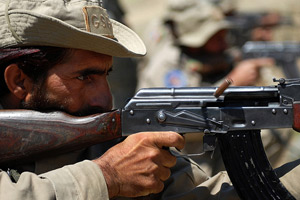According to the Wall Street Journal, military commanders in Afghanistan have arrived at the conclusion that allowing billions of dollars to flow to local and international contractors with the scantest of oversight is kind of a big problem. They “now believe,” the Journal reports, that “the massive infusions of cash are helping engender a culture of corruption that has undermined Afghan support for the government of President Hamid Karzai and the NATO forces that back it.” You think?
The US-led coalition is in the process of putting together a contract corruption-fighting unit dubbed Task Force 2010. It’s a catchy enough name. But I might have gone with something different. “2010” gets you wondering why there’s no Task Force 2009, or 2008, or 2007…really, why 9 years have passed without a similar unit being stood up. The Journal reports:
Up until now, much of the limited scrutiny that contractors have endured has focused on private security firms, some of which have allegedly paid off the Taliban to avoid attacks.
Officers directly involved with the new task force stressed that it plans to look beyond security firms and examine the full array of contracts, which range from delivering fuel and food to NATO forces to using coalition money to build health clinics and schools in remote villages.
Of particular concern is the frequent use of multiple sub-contracts on many contracts. U.S. officials already investigating corruption in Afghanistan say they have found evidence of companies, in particular construction firms, using a string of sub-contractors to shift cash to shell companies. The money then disappears, usually into foreign bank accounts.
A number of the primary contractors have ties to top Afghan officials or people with powerful political connections, officials say.
Task Force 2010 will look “at who are not only the subcontractors, but the subcontractors to the subcontractors—literally, where is the money going, and is it all above-board?” said Gen. David Petraeus, who commands U.S. Forces in the Middle East and Central Asia, Tuesday at a Congressional hearing on the war in Afghanistan.

















